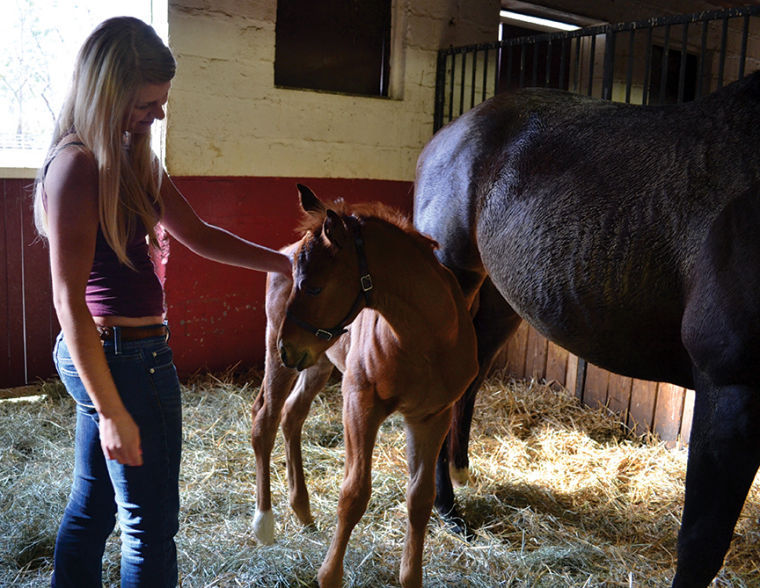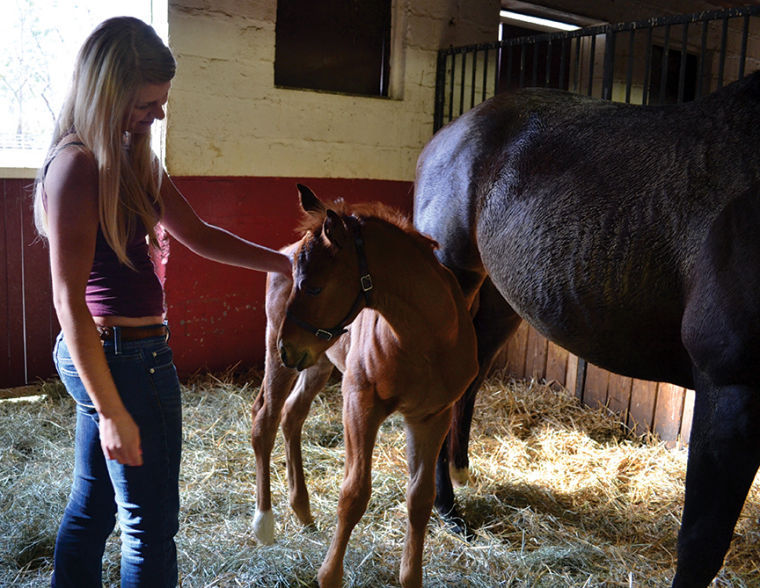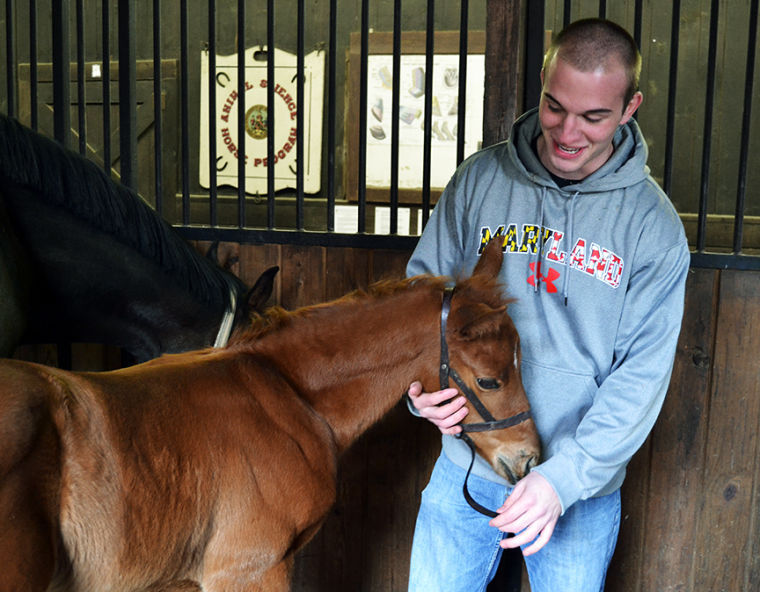It’s a rainy Monday afternoon, and Laura Michelotti is visiting one of the Campus Farm’s barns, checking in on Rebel, a thoroughbred colt born March 8.
“None of us had experience handling foaling before,” the junior animal sciences major said as Rebel chewed on the front of her jacket.
“He’s a ball of energy and lots of fun,” added Melinda Gilmer, a 2012 alumna.
Gilmer and Michelotti are part of a team of students who are caring for the colt and his mother, as well as another pregnant mare. The chestnut colt is the first born on the campus in nearly 30 years, and with another one on the way, the students and faculty who work at the farm and in the equine studies program are hoping the new arrivals will lead to the rebirth of the program.
This university was once a top destination for students looking to study equine reproduction. Until the 1980s, hands-on experience breeding horses was part of the curriculum, but the program fell into a slump. Leadership fluctuated, and the site near Ellicott City that hosted equine reproduction facilities was paved over for a new highway, forcing students to take field trips to local farms to get hands-on experience.
When equine studies coordinator Amy Burk came to the campus 11 years ago, she vowed to restore the program. She’s worked hard to bring in resources such as grants and to open another university-owned farm in Clarksville for equine research.
“The classes were really popular, but they just didn’t have that hands-on component,” Burk said. “It’s not the worst thing in the world, but when you want your students to graduate and be competitive for jobs, you’d like to have them be as best prepared as you can.”
One of the final steps was bringing back the mares for breeding, she said.
Other schools in the mid-Atlantic region offer that experience, and given the state’s thriving horse industry, Burk said there was no reason not to bring that aspect of the program back.
One difficulty they faced was finding room for proper horse reproduction facilities, Burk said. Through a grant from the National Resource Conservation Service, they were able to create a space for horses at the Clarksville farm in 2007.
Burk received a donation of two pregnant mares from local breeders in June 2012 — Cassie, Rebel’s mother, and Amazin’, who is due to give birth April 7. They were kept at the Clarksville facility until about two months ago when they came to the campus.
Money was by far the biggest concern. Caring for a single horse can cost $300 to $500 a month, Burk said, and even though Cassie and Amazin’ were donations, the cost of their care required multiple grants. Pregnant horses require additional health care and special nutrition.
“There’s a little bit of difference. You have to watch their nutrition more. Mares can also be a little moodier, but these guys are pretty good,” said Gilmer, who works on the farm but is not in Burk’s class.
Students enrolled in Burk’s equine reproduction class and farm employees — the “real superstars,” Burk said — took shifts watching over Cassie in the days leading up to Rebel’s birth. They slept in the Campus Farm’s office and the barn, waiting for Cassie to go into labor.
Every day, students visit the barn to brush manes, set out food and check on the horses’ progress, working shifts from 8 to 9 a.m. and 4 to 5 p.m. Michelotti said they all took a class at Shamrock Farm in Carroll County to prepare for working with the mares.
Even with all the work the mares require, students and farm employees said there’s no replacement for caring for a horse about to foal.
“It’s been a real eye-opening experience for them because you just don’t get to see foaling every day,” Burk said.
“You learn a different part of the horse industry than most people get to be a part of,” Gilmer added.
Soon, the entire university will get a chance to play a role in giving the colt his official name.
Rebel is an everyday name chosen by the students who care for him, but after the second colt is born, the university community will get to vote on the best name from a list chosen by department faculty.
“I don’t want to give anything away, but some of the names that have been submitted are really great,” Burk said. “Some of the best have Maryland or terrapin or Terp incorporated, which I really like.”
At the end of the semester, all four horses will move back to the Clarksville farm, but students will still get to work with them. They hope to rebreed Cassie and Amazin’, as well as take in two more horses for next year. The colts will be prepared for sale as racehorses in December — another area of expertise to which students aren’t normally exposed.
“If that goes well and we can keep the money coming in to pay for this program, then we may expand from there,” Burk said.
A foal named Rebel is being taken care of by a team of students, including Kristen Brady (above). The chestnut colt was the first born on the campus in nearly 30 years.
Steven Moirano, a junior animal sciences major, cares for Rebel, the first colt born on the campus in nearly 30 years. Several students from an equine reproduction class took turns sleeping in the Campus Farm’s office and barn as they awaited his birth.





